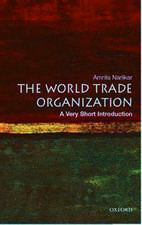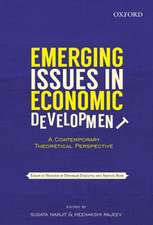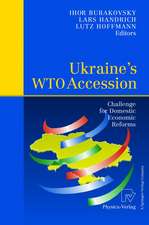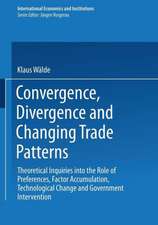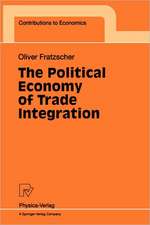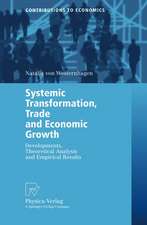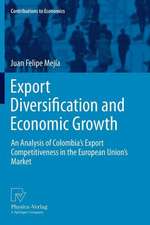International Trade, Wage Inequality and the Developing Economy: A General Equilibrium Approach: Contributions to Economics
Autor Sugata Marjit, Rajat Acharyyaen Limba Engleză Paperback – 15 apr 2003
Din seria Contributions to Economics
- 18%
 Preț: 1001.81 lei
Preț: 1001.81 lei -
 Preț: 90.83 lei
Preț: 90.83 lei - 15%
 Preț: 649.06 lei
Preț: 649.06 lei - 18%
 Preț: 1109.92 lei
Preț: 1109.92 lei - 24%
 Preț: 657.09 lei
Preț: 657.09 lei - 18%
 Preț: 976.54 lei
Preț: 976.54 lei - 17%
 Preț: 361.03 lei
Preț: 361.03 lei - 18%
 Preț: 1027.83 lei
Preț: 1027.83 lei -
 Preț: 283.93 lei
Preț: 283.93 lei - 15%
 Preț: 644.95 lei
Preț: 644.95 lei - 15%
 Preț: 638.24 lei
Preț: 638.24 lei -
 Preț: 394.29 lei
Preț: 394.29 lei - 15%
 Preț: 636.80 lei
Preț: 636.80 lei - 15%
 Preț: 637.78 lei
Preț: 637.78 lei - 18%
 Preț: 723.69 lei
Preț: 723.69 lei - 15%
 Preț: 635.47 lei
Preț: 635.47 lei - 15%
 Preț: 634.00 lei
Preț: 634.00 lei -
 Preț: 392.75 lei
Preț: 392.75 lei -
 Preț: 383.33 lei
Preț: 383.33 lei - 15%
 Preț: 637.28 lei
Preț: 637.28 lei - 15%
 Preț: 636.80 lei
Preț: 636.80 lei - 18%
 Preț: 950.96 lei
Preț: 950.96 lei - 15%
 Preț: 634.68 lei
Preț: 634.68 lei -
 Preț: 387.38 lei
Preț: 387.38 lei - 15%
 Preț: 647.27 lei
Preț: 647.27 lei - 15%
 Preț: 636.63 lei
Preț: 636.63 lei - 15%
 Preț: 639.73 lei
Preț: 639.73 lei -
 Preț: 385.62 lei
Preț: 385.62 lei - 15%
 Preț: 641.85 lei
Preț: 641.85 lei - 20%
 Preț: 649.60 lei
Preț: 649.60 lei - 15%
 Preț: 641.71 lei
Preț: 641.71 lei -
 Preț: 387.96 lei
Preț: 387.96 lei - 15%
 Preț: 645.47 lei
Preț: 645.47 lei -
 Preț: 385.08 lei
Preț: 385.08 lei - 15%
 Preț: 646.62 lei
Preț: 646.62 lei -
 Preț: 383.33 lei
Preț: 383.33 lei - 15%
 Preț: 638.43 lei
Preț: 638.43 lei -
 Preț: 381.21 lei
Preț: 381.21 lei - 15%
 Preț: 642.51 lei
Preț: 642.51 lei - 15%
 Preț: 637.78 lei
Preț: 637.78 lei - 15%
 Preț: 641.71 lei
Preț: 641.71 lei -
 Preț: 384.70 lei
Preț: 384.70 lei -
 Preț: 379.86 lei
Preț: 379.86 lei -
 Preț: 378.34 lei
Preț: 378.34 lei -
 Preț: 384.70 lei
Preț: 384.70 lei -
 Preț: 388.52 lei
Preț: 388.52 lei - 15%
 Preț: 641.71 lei
Preț: 641.71 lei -
 Preț: 381.00 lei
Preț: 381.00 lei - 15%
 Preț: 644.95 lei
Preț: 644.95 lei -
 Preț: 386.00 lei
Preț: 386.00 lei
Preț: 382.75 lei
Nou
Puncte Express: 574
Preț estimativ în valută:
73.24€ • 78.32$ • 61.07£
73.24€ • 78.32$ • 61.07£
Carte tipărită la comandă
Livrare economică 18 aprilie-02 mai
Preluare comenzi: 021 569.72.76
Specificații
ISBN-13: 9783790800319
ISBN-10: 3790800317
Pagini: 192
Ilustrații: XI, 176 p.
Dimensiuni: 155 x 235 x 10 mm
Greutate: 0.29 kg
Ediția:Softcover reprint of the original 1st ed. 2003
Editura: Physica-Verlag HD
Colecția Physica
Seria Contributions to Economics
Locul publicării:Heidelberg, Germany
ISBN-10: 3790800317
Pagini: 192
Ilustrații: XI, 176 p.
Dimensiuni: 155 x 235 x 10 mm
Greutate: 0.29 kg
Ediția:Softcover reprint of the original 1st ed. 2003
Editura: Physica-Verlag HD
Colecția Physica
Seria Contributions to Economics
Locul publicării:Heidelberg, Germany
Public țintă
ResearchCuprins
1: Introduction.- I Evidence and the Debate.- 2: Wages and Employment.- II Explaining Symmetric Wage-Gap.- 3: The Standard Trade Theory:How Far Does It Go?.- 4: Trade Liberalization and Symmetric Wage-Gap.- 5: Input Trade: An Alternative Explanation.- III Trade, Capital Flow and Employment.- 6: Liberalization and Employmentin the Organized Sector.- IV Trade Liberalization, Wage Inequality and Employment in the South.- 7: Diverse Trade Pattern,Complementarity and Fragmentation.- 8: Segmented Input Marketsand Non-Traded Good.- 9: Trade, Skill Formation and the Wage-Gap.- 10: Conclusion.- List of Figures.- List of Tables.
Recenzii
From the reviews:
"The book … explores the analytical borders of the standard trade model and shows how various modifications, motivated by a developing country (DC) perspective, can indeed reconcile the theory with the presumed facts. … I find the book by Marjit and Acharyya to be a very helpful contribution to the literature … . Apart from its obvious usefulness as a text for advanced courses on trade theory … the book may also serve as a useful source of inspiration for researchers … ." (Erich Gundlach, Review of World Economics, Vol. 140 (2), 2004)
"The book … explores the analytical borders of the standard trade model and shows how various modifications, motivated by a developing country (DC) perspective, can indeed reconcile the theory with the presumed facts. … I find the book by Marjit and Acharyya to be a very helpful contribution to the literature … . Apart from its obvious usefulness as a text for advanced courses on trade theory … the book may also serve as a useful source of inspiration for researchers … ." (Erich Gundlach, Review of World Economics, Vol. 140 (2), 2004)
Textul de pe ultima copertă
This book deals with the impact that international trade is likely to have on the skilled-unskilled wage gap in a typical developing economy. This is the first theoretical monograph on this particular issue which has already generated substantial debate and voluminous work for the developed countries. A unique feature of this work is that it tries to explain the possibility of rising inequality across trading nations and looks at the segmented labour markets of the poor economies. It makes convincing arguments that the standard general equilibrium models, the main workhorse of trade theory, can be given a creative facelift to address a number of critical and emerging issues in the area of trade and development.
Caracteristici
First theoretical monograph on the impact of international trade on the skilled-unskilled wage gap in developing countries Includes supplementary material: sn.pub/extras


